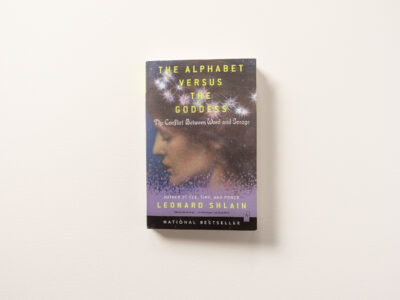It seems she was usurped by the written word. That’s the case Leonard Shlain makes in his fascinating page-turner, The Alphabet Versus the Goddess: The Conflict Between Word and Image.
He surveys human history showing that the rise of literacy rewired our brains to our current left-brain dominant, masculine mode of thinking. The shift from visual (right brain) to written (left brain) communication, he says, led to the rise of patriarchy and the demise of feminine values, goddess worship, and women’s rights.
“Linearity, sequence, abstraction, and analysis are the mental processes used in alphabet spelling. They are also the processes that undergird the left hemisphere’s most representative functions—language, logic, causality, and math computation. The left is the hemisphere principally responsible for the hunting-and-killing human survival strategy. Literacy preferentially reinforces the left’s dominance over the right hemisphere, home of the gathering-and-nurturing human survival strategy. The values of the right hemisphere have suffered for millennia because literacy has literally held cultures that learned spelling “spellbound.”
In the culture at large, this trance has manifested as misogyny, harsh patriarchy, and a distrust of images that periodically erupts into a destructive anti-art frenzy. I propose that alphabets are the principal reason cultures have reviled goddesses, banned women from conducting religious ceremonies, and ignored or devalued the beauty and beneficence of nature.”
Speaking of nature, the author offers this insight about NASA’s first photograph of the Earth taken from space:
“The masculine perception of nature and the Earth itself as “things” to be conquered made the space program possible. The photo it generated began to instill in everyone who saw it an understanding that the Earth must be honored, protected, and loved. That many environmentalists are men confirms this change in orientation.”
And with a positive outlook for the future, he suggests that screen culture, which I thought was the downfall of society, may actually be helping us in the very long term. It may well be that the simple process of looking at pictures, no matter the medium or the content, is empowering our right brains and moving us to a more balanced society.
Who would have thought?
The Alphabet Versus the Goddess: The Conflict Between Word and Image


 The Gaia Hypothesis, Part 2
The Gaia Hypothesis, Part 2